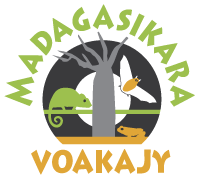We carry out training and capacity building for Malagasy students, communities and environment professionals.
Research Students
Since 2005 we have sponsored and trained a number of Malagasy students. To date we have supported different students obtain three different types of degrees:
1. Diplôme d’Etudes Approfondies
2 .Diplôme d’Ingénieur en Sciences Agronomiques
3. Diplôme d’Etudes Supérieures Spécialisées
We work closely with our university partners who are based in theses different institutions:
1. Département de Biologie Animale, Faculté des Sciences, Université d’Antananarivo
2. Ecole Supérieure des Sciences Agronomiques, Département des Eaux et Forets, Université d'Antananarivo
3. Département des Sciences Biologie, Faculté des Sciences, Université de Toliara
4. Departément d’Economie, Facultés de Droit, d’Economie, de Gestion et de la Sociologie, Université d’Antananarivo
5. Centre Ecologique Libanona, Fort Dauphin.
{joomplu:77 not linked}{joomplu:74 not linked}{joomplu:88 not linked}
If you are a student registered at a Malagasy university and are interested in a research project please This email address is being protected from spambots. You need JavaScript enabled to view it. for current availability.
Communities
We believe in empowering civil society and communities to manage natural resources and we are actively supporting a number of community-based groups in our priority sites. At the moment, these are located in the Anosy, Menabe and Alaotra Mangoro Regions.
We support commnunities to establish formal associations, we then support these associations through the provision of different forms of training and essential equipment where necessary. Click for more information on this subject at our orphan forest and Mangabe sites.
Professionals
In many circumstances we also need to support the work of environment professionals and these have ranged from government personnel to national park guides. As an example, we provided training to the tourist guides and national park agents in Bemaraha National Park. This consisted of formal classroom training and field excercises led by national experts in the fields of birds, bats and reptiles. This was supported by advanced English and French language training as well as detailed briefings on etiquette.



